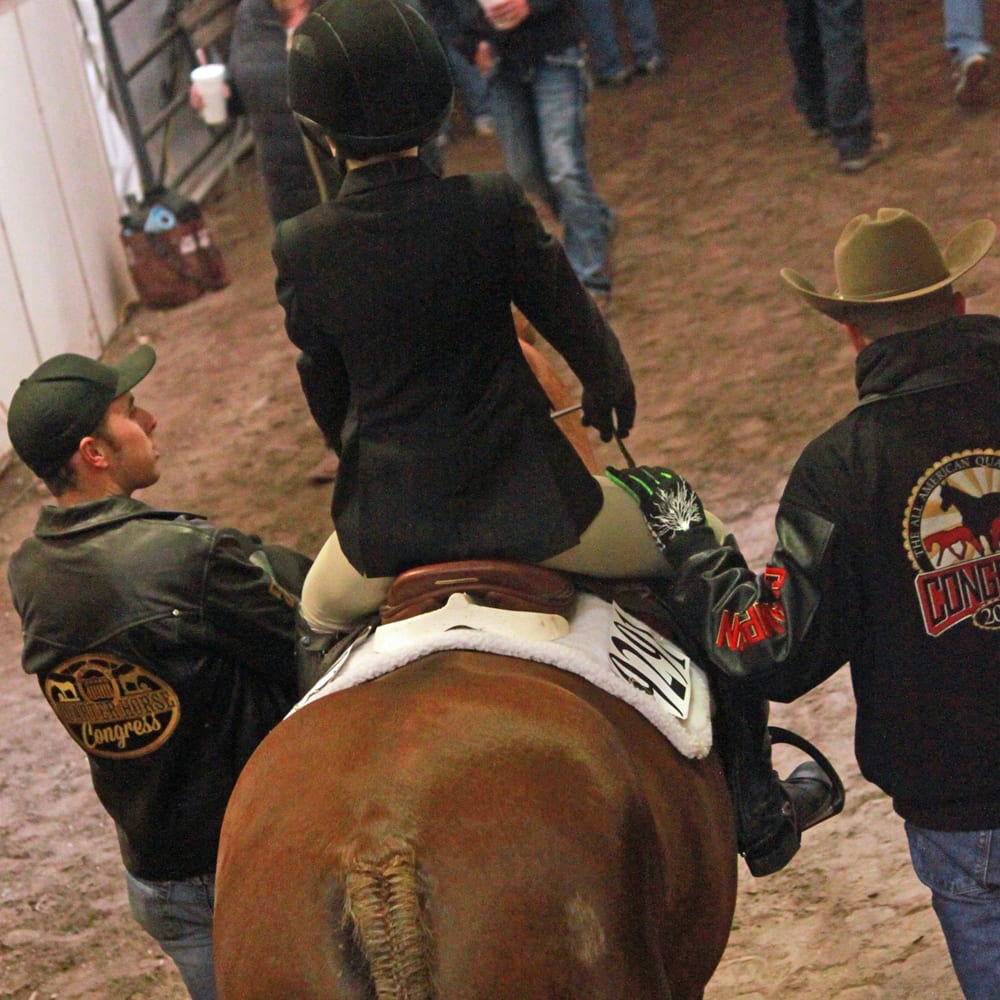Horse showing is not a sport for the faint of heart. It is subjective (we actually pay people to judge us), expensive, requires blood, sweat, and tears, and can oftentimes be described as ruthless.
For those who are new to the show world or for those who are naturally more meek and mild in nature, it can be a daunting world.
Add to that a living, breathing and highly intelligent animal that weighs around 1100-1300 pounds and it can be downright terrifying.
With the AQHA Congress coming up (which is, perhaps, the most intimidating show of all-time) GoHorseShow talked to four top professionals and one self-proclaimed timid rider to get the scoop on how to best handle these situations.
1. Patience, Patience, Patience
In the high-strung world of horse training and showing, patience is the most valuable skill a trainer or exhibitor can have.
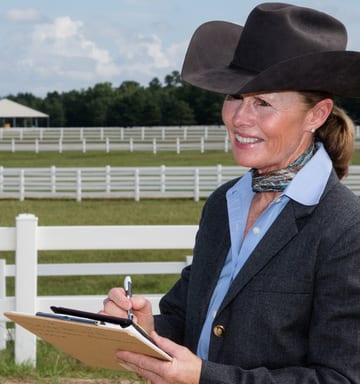 AQHA judge, equestrian team educator, and 2008 AQHA Horsewoman of the Year Carla Wennberg said when it comes to coaching a novice or timid rider, “It takes weeks of patience for these kinds of riders to learn the mechanics and achieve the confidence required for them to be successful. You have to be creative with your thought process and keep it basic.”
AQHA judge, equestrian team educator, and 2008 AQHA Horsewoman of the Year Carla Wennberg said when it comes to coaching a novice or timid rider, “It takes weeks of patience for these kinds of riders to learn the mechanics and achieve the confidence required for them to be successful. You have to be creative with your thought process and keep it basic.”
Wennberg (pictured right) also said trainers and coaches should never assume a novice or timid rider knows something.
“Novice and timid riders don’t know how to read horses yet,” she said. “To get them exposed and comfortable with many different (equine) personalities is a great way to build confidence in them.”
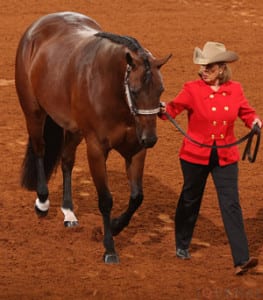 AQHA Halter trainer Kathy Smallwood of Pilot Point, Texas said, “If you can make the practice time into a fun session with lots of encouragement, it helps calm the nerves of the exhibitor. I like to change up the basic routine of the halter pattern and do a lot of walking and trotting in straight lines and maneuvering around cones before practicing the set up.”
AQHA Halter trainer Kathy Smallwood of Pilot Point, Texas said, “If you can make the practice time into a fun session with lots of encouragement, it helps calm the nerves of the exhibitor. I like to change up the basic routine of the halter pattern and do a lot of walking and trotting in straight lines and maneuvering around cones before practicing the set up.”
Smallwood (pictured left) also said to be careful not to rush any kind of a lesson and make a conscious effort to put in a little more time with these exhibitors at the shows.
“Sometimes trainers aren’t the best at appearing like a real human, especially at horse shows. I like to try and find the client’s sense of humor and what opens them up a bit to sort of break the ice. If you have a little more involvement with the whole program, it makes it easier for them.”
2) Don’t Be a Negative Nancy
Some people learn well and can achieve results while being screamed at.
While for many others, (especially novice and timid riders) this is simply a recipe for disaster.
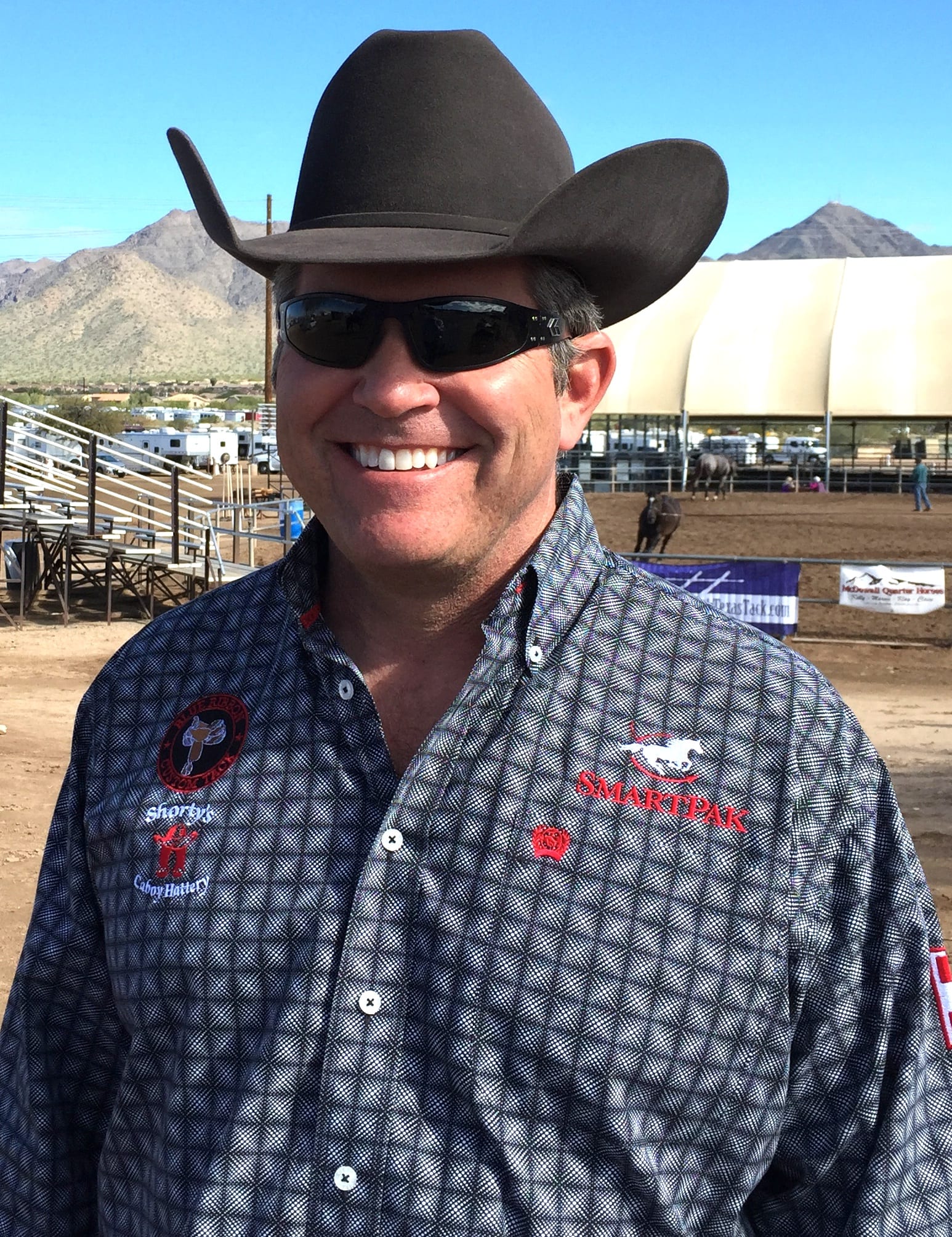 Jason Martin (pictured right) of Highpoint Performance Horses said, “Our philosophy is to try and instill the absolute most confidence in a person they can have. When our clients go to bed at night, especially at the big shows like the Congress, we want them to feel good about themselves. These people pay a lot of money to do this sport, yelling and screaming can shut them down.”
Jason Martin (pictured right) of Highpoint Performance Horses said, “Our philosophy is to try and instill the absolute most confidence in a person they can have. When our clients go to bed at night, especially at the big shows like the Congress, we want them to feel good about themselves. These people pay a lot of money to do this sport, yelling and screaming can shut them down.”
Smallwood agreed, “Criticism really runs them off. You have to make it fun and work around it. Lots of positive reinforcement is key.”
Wennberg said that she likes to walk with her students as they ride during lessons. This can also help them feel that you are really there for them and further build their confidence.
And when it comes to the big shows like the Congress, it is vital that these riders have confidence.
AQHA Professional Horseman, Troy Compton, of Purcell, Oklahoma said, “The Congress is such a completely different atmosphere. It is serious competition. It can ruin a person’s confidence and waste a lot of money if they aren’t ready. They need to have confidence and be able to control their animal before even considering a show of that magnitude.”
3) The Right Horse is a BIG Key
That is to say, that green broke two-year-old that a client’s youth kid wants to be their next all-around horse is probably not the best choice.
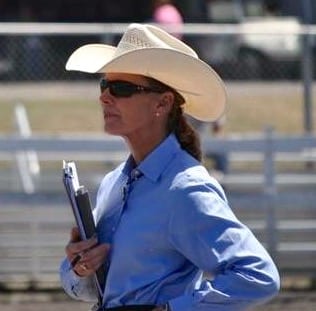 “You want a horse that is bombproof but not too lazy,” said Wennberg. “The horse has to be sensitive enough to respond but not naughty or green. Riders can quickly lose their confidence on a naughty or green horse.”
“You want a horse that is bombproof but not too lazy,” said Wennberg. “The horse has to be sensitive enough to respond but not naughty or green. Riders can quickly lose their confidence on a naughty or green horse.”
Martin said, “The seasoned, good-minded, fifteen-year-old (and even older) horses are really perfect for the timid and novice riders. There really is a place for them. These horses can take riders to a whole new level of confidence and can help that person believe they can do it.”
Especially if the exhibitor plans on showing at a show like the Congress.
“You want a horse that can handle that kind of atmosphere,” said Compton. “One that can both stay sound and keep a brain.”
Smallwood said, “Really quiet horses are ideal. A lot of times horses don’t match the exhibitor and that can really hinder both of their success.”
4) Set Realistic Expectations
 The first thing a trainer should do with any new client, timid, novice, or not is to sit them down for a serious conversation.
The first thing a trainer should do with any new client, timid, novice, or not is to sit them down for a serious conversation.
Wennberg said, “You need to ask them what they want out of riding.”
To those of us who show, it might be shocking that not everyone wants the same things out of their show experience and depending on a variety of factors, not everyone is going to be able to achieve that top level status.
But for those who do want it all, it then becomes your job as a trainer and coach to point them in the right direction.
“You really have to have realistic expectations based on a person’s skill level,” said Compton. “When going to a show like the Congress, you have to believe you can win to even be in the top ten. It is easy for people to get discouraged because it is such an intimidating experience.”
Because of this, it is crucial that trainers talk to their clients who may not be ready for a show of that magnitude and find a kind and polite way to… well, talk them out of it. Another option would be to suggest that they go for the first time as a spectator. The circus that is the Congress is much less intimidating the first time around if you are just there to see the sights and get a lay of the land.
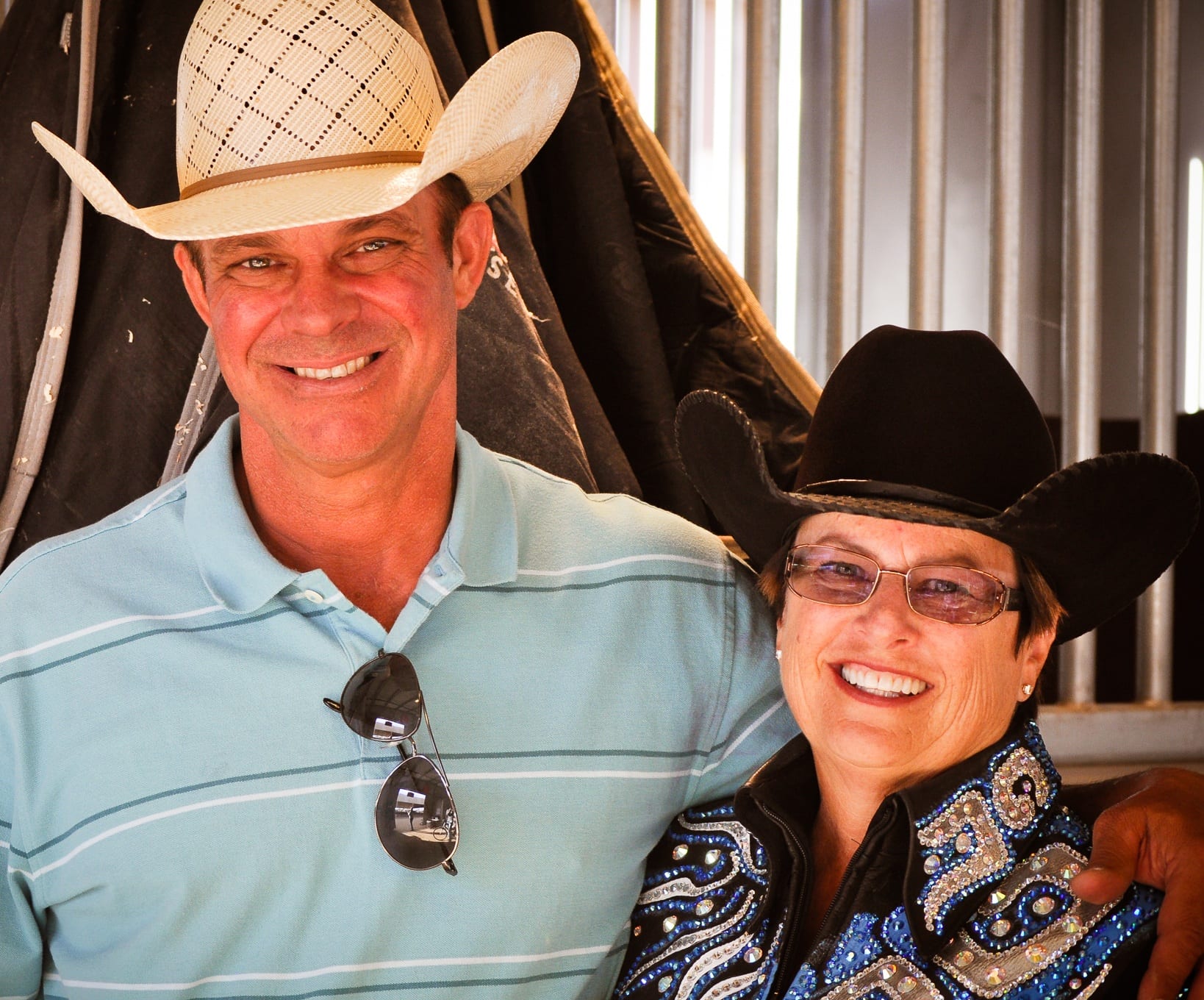 However, Compton said, “If they insist on going, the next conversation needs to be the one about having realistic expectations and using it as a learning experience. Congress should never be anyone’s first big show. I also like to tell all my clients, regardless of skill level, that the crowd at the Congress is not like any other crowd we show in front of. There are a lot of wrecks, it is an incredibly spooky atmosphere, and having that many eyes on you can freak people out.”
However, Compton said, “If they insist on going, the next conversation needs to be the one about having realistic expectations and using it as a learning experience. Congress should never be anyone’s first big show. I also like to tell all my clients, regardless of skill level, that the crowd at the Congress is not like any other crowd we show in front of. There are a lot of wrecks, it is an incredibly spooky atmosphere, and having that many eyes on you can freak people out.”
A good rule of thumb is that if you are achieving results at the regional level, have handled a few big circuits before (think Sun Circuit or Redbud) and have prepared for an entire year mentally for the pressure and the emotionally draining experience that is the AQHA Congress, then you have set a realistic expectation and should be ready.
Martin said it is important for everyone to remember that “The groundwork has already been laid and whatever you do at the Congress isn’t going to help.”
Set those realistic expectations early, especially if you are new to the game or have a tendency to crack under pressure.
5) Be A Cheerleader
Sometimes, even seasoned veterans can get to a show like the Congress and all of the sudden they are nervous and stressed out (because duh, it’s the Congress).
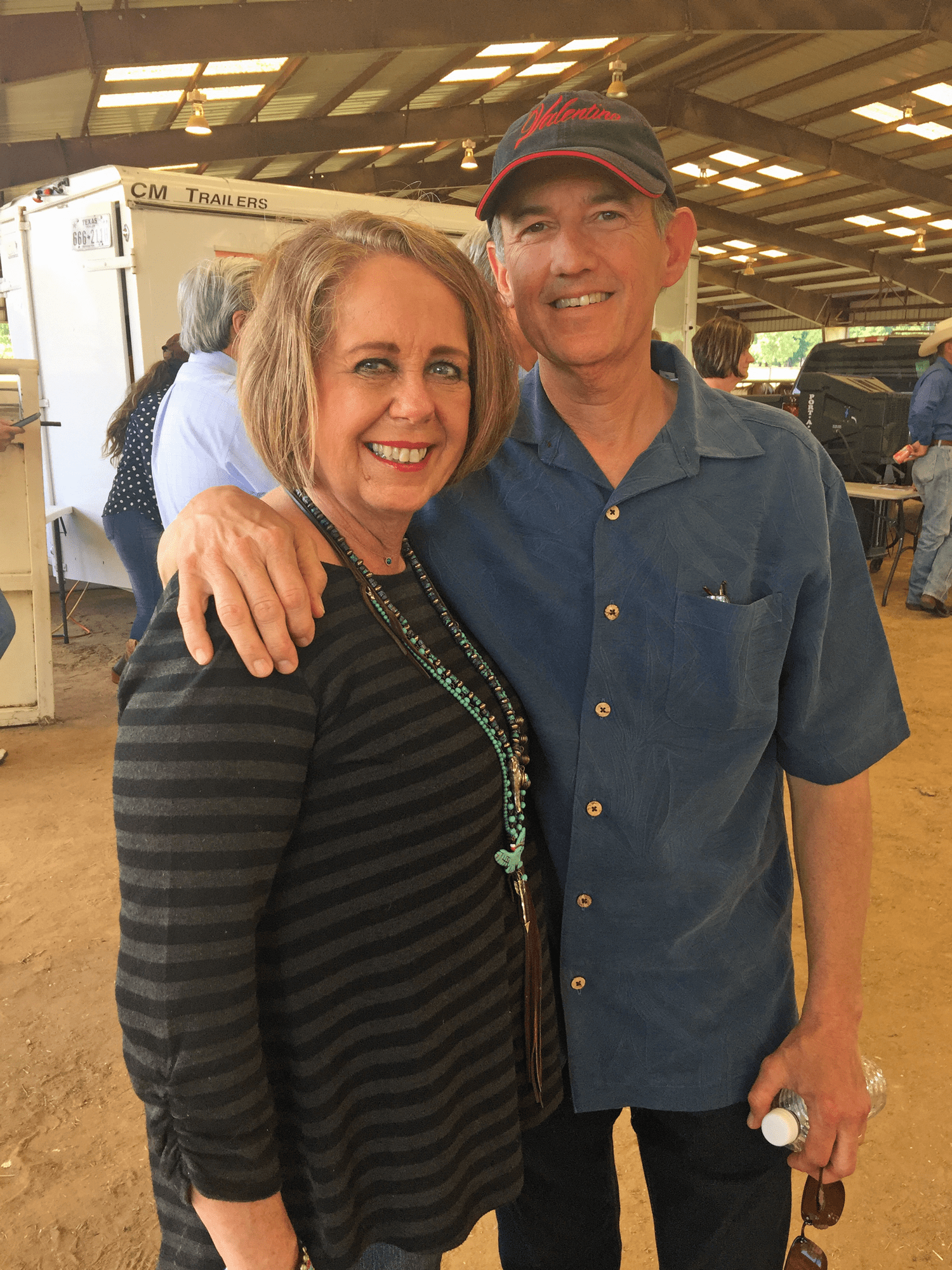 Smallwood said, “Nervousness breeds timidness so if you can find a way to get the person’s stress level down, that will be an incredible help.”
Smallwood said, “Nervousness breeds timidness so if you can find a way to get the person’s stress level down, that will be an incredible help.”
Smallwood likes to do a refresher course the night before the class but not one that drills and drills and drills.
(Remember, the groundwork has already been laid.)
Martin agreed and said, “Try not to drill them the night before. With my clients, especially the ones that are novice or timid, if they get it right or even acceptable the first time, I am always positive about it and we quit.”
On show day, it is equally, if not more important to keep that positive attitude.
Smallwood said, “I walk right up to the gate with them and continue to give encouragement right up until they walk in.”
Trainers may or may not realize that what they project onto their clients has a huge impact. If an exhibitor is already feeling less than confident, a trainer that isn’t cheering them on will not do anything to bolster their score, improve their confidence level, or diminish their timidness.
Be a cheerleader.
Final Thoughts from a Self-Proclaimed Timid Rider
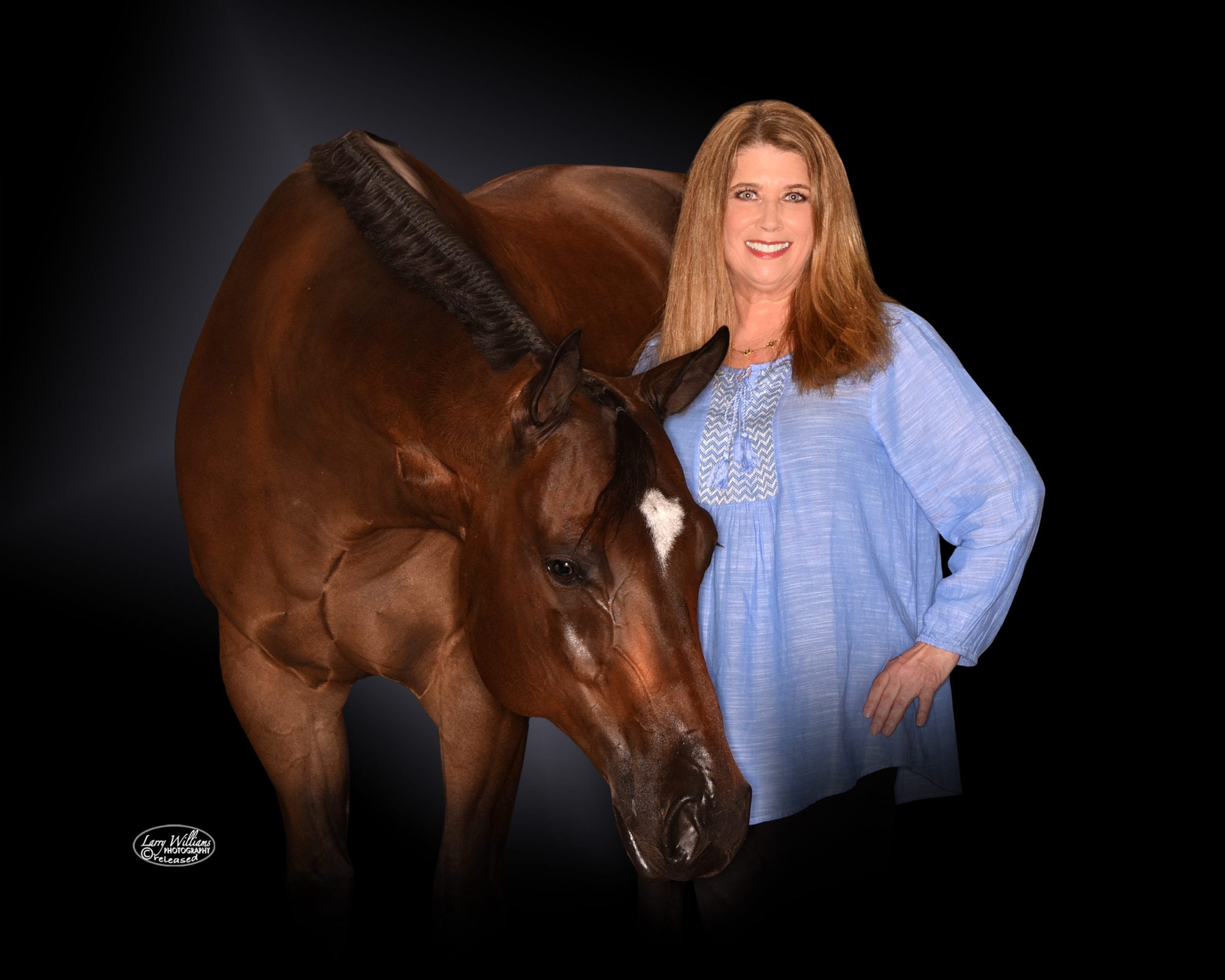 Bonnie Sheren of Studio City, California, an AQHA Select rider, says the two biggest things to build confidence in novice and timid riders is the right horse and the right trainer.
Bonnie Sheren of Studio City, California, an AQHA Select rider, says the two biggest things to build confidence in novice and timid riders is the right horse and the right trainer.
“You have to have a horse and a trainer that instill confidence in you,” says Sheren who rides with Highpoint Performance horses. “You have to have a horse you can trust, one you are comfortable with, and a trainer that understands the psychology of the person.”
Sheren said that trainers should take the time to try and figure out who their client is as a person and be able to “read” them, as they would a horse.
“Obviously trainers want their students to do it right but they also need to understand that we really are trying,” she said.
When it comes to big shows like the AQHA Congress, Sheren had some great tips for fellow timid riders.
 “At some point, you have to step up and challenge yourself, even if you aren’t one hundred percent ready,” she said. “But I would say to definitely make sure you are well rested, not overly tired, and try not to overthink things. Because no matter what people tell you about Congress, if you have never been, it’s still crazier than what people tell you.”
“At some point, you have to step up and challenge yourself, even if you aren’t one hundred percent ready,” she said. “But I would say to definitely make sure you are well rested, not overly tired, and try not to overthink things. Because no matter what people tell you about Congress, if you have never been, it’s still crazier than what people tell you.”
One of the ways Sheren recommends to prevent over-thinking is to avoid over practicing.
“You can do too much at the bigger shows,” she said. “If you are practicing and it isn’t going well and you don’t end on a good note, then all you think about is how bad the practice went. You have to be willing to give up some of the control.”
For Sheren, riding a lot at home helps her a tremendous amount.
“It helps me to know my horses and build a good rapport with my trainers,” she said.
Finally, Sheren says to always give yourself some credit.
“Even if you bomb it, try to come out of the pen and look at the things that you did well,” she said. “You have to know what you did wrong too, so you can improve on it, but always give yourself a pat on the back.”


